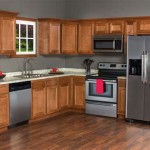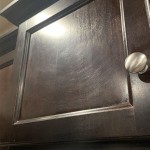How to Clean Your Kitchen Cupboards
Maintaining a clean and organized kitchen is essential for both the functionality and aesthetics of your home. Kitchen cupboards, being heavily used for storing various items, tend to accumulate dirt, grime, and grease over time. Regular cleaning is crucial to prevent the build-up of unpleasant odors, stains, and potential health hazards. This article provides essential aspects to consider when cleaning your kitchen cupboards, ensuring their hygiene and longevity.
Removing Dirt and Debris
The first step in cleaning your cupboards is to remove any loose dirt, crumbs, or debris. Use a clean, dry cloth or a vacuum cleaner with a soft brush attachment to gently wipe down the surfaces. This will eliminate any surface-level dirt, making it easier to proceed with further cleaning.
Using Cleaning Solutions
For effective cleaning, a suitable cleaning solution is necessary. Depending on the material of your cupboards, choose an appropriate cleaner. For wooden cupboards, a mild dish soap diluted in warm water is generally sufficient. For laminate or melamine surfaces, a specialized cleaner designed for these materials is recommended. Avoid using abrasive cleaners or harsh chemicals as they can damage the finish of your cupboards.
Cleaning Shelves and Drawers
Shelves and drawers within your cupboards require thorough cleaning as they often collect dust and food particles. Remove all contents and discard any expired or unwanted items. Wipe down the shelves and drawers using the chosen cleaning solution, paying attention to corners and edges where dirt tends to accumulate. Allow ample time for them to dry before replacing the contents.
Disinfecting Handles
Cupboard handles are frequently touched and can harbor germs and bacteria. Regularly disinfecting handles is important to prevent the spread of harmful microorganisms. Use a disinfectant solution recommended for your cupboard material and wipe down the handles thoroughly. Allow them to dry completely before using the cupboards again.
Deodorizing
If your cupboards have developed an unpleasant odor, deodorizing them is essential to freshen them up. Place an open box of baking soda inside the cupboards for several hours to absorb odors. Alternatively, you can use a commercial deodorizer designed for enclosed spaces.
Preventing Future Buildup
To minimize the frequency of deep cleaning, preventive measures can be taken. Regularly wipe down cupboard surfaces to prevent dirt accumulation. Avoid storing food items in open containers and use airtight containers instead. Additionally, consider lining shelves with shelf liners to catch spills and prevent stains.
Conclusion
By following these essential aspects, you can effectively clean and maintain your kitchen cupboards, ensuring their hygiene and longevity. Regular cleaning not only improves the aesthetics of your kitchen but also promotes a healthy and pleasant environment for food preparation and storage.

How To Clean Kitchen Cabinets 9 Basics Bob Vila

Cleaning Tips For Your Newly Refaced Kitchen Cabinets Kcr

How To Clean Kitchen Cabinets House Cleaning Services Baton Rouge

3 Super Easy Ways To Clean White Kitchen Cabinets And Avoid

How Often Should You Really Clean Your Kitchen Cabinets

Clean Kitchen Cabinets Off With These Tips And Hints

Ultimate Guide To Cleaning Kitchen Cabinets Cupboards Foodal
:max_bytes(150000):strip_icc()/ways-to-clean-wood-kitchen-cabinets-3017289-01-765f893e7cca49a1ab72d7c49efdf518.jpg?strip=all)
Tips For Cleaning Food Grease From Wood Cabinets

How To Clean Your Kitchen Cabinets Designcafe

Effective Ways To Clean Your Kitchen Cabinets Nuzum
Related Posts








